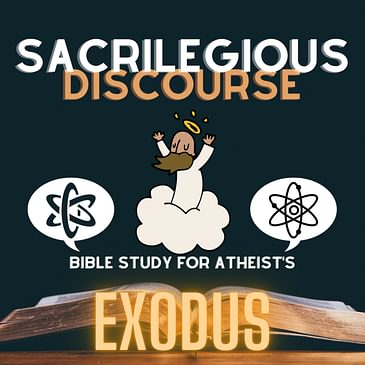Husband and Wife cover Exodus chapter 31:
The Call of Bezaleel and Aholiab / The Sabbath as a Sign;
and chapter 32:
The Golden Calf.
Aaron leads Israel into an orgy. God throws another tantrum. People are murdered, survivors do shots of Goldschläger, and there's yet another plague. Finally, let's be honest - who among us DOESN'T resent buying light bulbs?
Join us on DISCORD: https://discord.gg/8RwwMrb5zK
Skip the ads by joining Acast+ https://plus.acast.com/s/6331d364470c7900137bb57d
Thank you for stopping by Sacrilegious Discourse - Bible Study for Atheists!
Check out these links for more information about our podcast and merchandise:
Our Homepage: https://sacrilegiousdiscourse.com/
Help support us by subscribing on Patreon: https://www.patreon.com/sacrilegiousdiscourse
Exodus 31
In this chapter, God gives Moses instructions for building the Tabernacle, a portable temple that the Israelites would use to worship him. God also gives Moses the Ten Commandments, which are a set of laws that the Israelites were supposed to follow.
From an atheist perspective, these events could be interpreted as a human creation. The Israelites may have been inspired by their own experiences and beliefs to create these stories. The Ten Commandments, for example, may have been based on existing ethical codes or laws.
Exodus 32
In this chapter, the Israelites make a golden calf while Moses is up on Mount Sinai receiving the Ten Commandments. When Moses returns and sees what they have done, he is furious and breaks the tablets of the Ten Commandments.
From an atheist perspective, this event could be interpreted as a reflection of human nature. The Israelites were not perfect, and they were capable of making mistakes. They may have been tempted by the golden calf, which represented their own desires and ambitions.
The story of Exodus 31 and 32 can be seen as a cautionary tale about the dangers of religious extremism. It shows how people can be led astray by their own beliefs, and how those beliefs can be used to justify harmful actions.
Here are some additional points that could be made in an atheist summary of Exodus chapters 31 and 32:
- The Ten Commandments are not unique to the Israelites. Similar codes of law can be found in other ancient cultures.
- There is no archaeological evidence to support the existence of the Tabernacle or the golden calf.
- The story of Exodus is full of contradictions and inconsistencies.
Overall, an atheist interpretation of Exodus chapters 31 and 32 would view these events as products of human imagination and creativity, rather than as divine revelation.
Hosted on Acast. See acast.com/privacy for more information.






